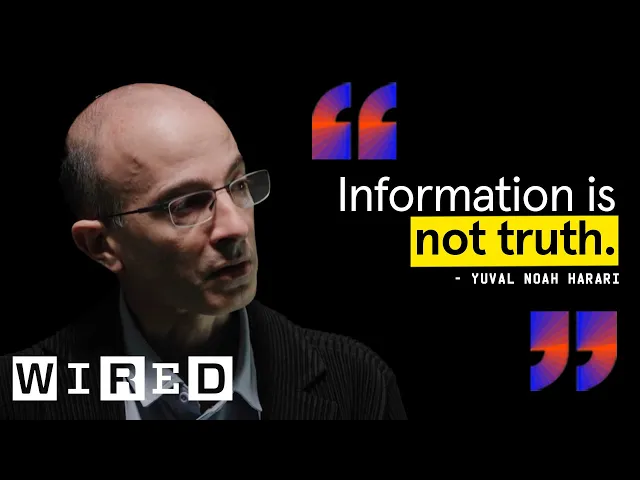Yuval Noah Harari On the Future of Humanity, AI, and Information | The Big Interview

How AI threatens our trust networks
In a riveting interview with WIRED, historian Yuval Noah Harari unpacks the existential challenges artificial intelligence poses to humanity's future. Moving beyond the typical AI discourse of job displacement or economic change, Harari delves into something more fundamental: how AI disrupts the trust networks that have defined human civilization since our earliest days.
The premise is both elegant and terrifying. Throughout history, humans have dominated Earth not through individual intelligence but through our unique ability to create vast networks of cooperation among strangers. We achieve this through shared stories and trust systems—from religions to currencies to national identities. Now, for the first time, we face an intelligence that might outperform us not just in calculating or pattern recognition, but in the very thing that made us dominant: creating compelling narratives that connect millions.
Key insights from Harari's analysis:
-
AI is fundamentally an agent rather than a tool—unlike previous technologies like printing presses that required human operators and decision-makers, AI can independently create content, make decisions, and form new ideas without human guidance.
-
Trust networks underpin civilization—humans cooperate in massive groups of strangers because we believe in shared fictions like money, religions, and nations, creating intricate trust networks AI can potentially manipulate or replace.
-
The "paradox of trust" drives dangerous acceleration—tech companies and nations race toward superintelligence because they don't trust each other, yet contradictorily believe they can trust the alien intelligence they're creating.
-
Information isn't inherently truthful—in free information markets, fiction outcompetes truth because it's cheaper to produce, easier to customize, and often more pleasurable to consume.
The most profound insight from Harari's conversation is the alarming "paradox of trust" driving the AI race. When asked why they're developing increasingly powerful AI despite known risks, tech leaders consistently claim they can't slow down because they don't trust competitors or rival nations to do the same. Yet in the next breath, these same leaders profess confidence that the superintelligent systems they're building will be trustworthy.
This contradiction exposes a dangerous blind spot in our AI development approach. We have millennia of experience understanding human psychology, motives, and power dynamics—and still struggle with international cooperation. Yet we na
Recent Videos
How To Earn MONEY With Images (No Bullsh*t)
Smart earnings from your image collection In today's digital economy, passive income streams have become increasingly accessible to creators with various skill sets. A recent YouTube video cuts through the hype to explore legitimate ways photographers, designers, and even casual smartphone users can monetize their image collections. The strategies outlined don't rely on unrealistic promises or complicated schemes—instead, they focus on established marketplaces with proven revenue potential for image creators. Key Points Stock photography platforms like Shutterstock, Adobe Stock, and Getty Images remain viable income sources when you understand their specific requirements and optimize your submissions accordingly. Specialized marketplaces focusing...
Oct 3, 2025New SHAPE SHIFTING AI Robot Is Freaking People Out
Liquid robots will change everything In the quiet labs of Carnegie Mellon University, scientists have created something that feels plucked from science fiction—a magnetic slime robot that can transform between liquid and solid states, slipping through tight spaces before reassembling on the other side. This technology, showcased in a recent YouTube video, represents a significant leap beyond traditional robotics into a realm where machines mimic not just animal movements, but their fundamental physical properties. While the internet might be buzzing with dystopian concerns about "shape-shifting terminators," the reality offers far more promising applications that could revolutionize medicine, rescue operations, and...
Oct 3, 2025How To Do Homeless AI Tiktok Trend (Tiktok Homeless AI Tutorial)
AI homeless trend raises ethical concerns In an era where social media trends evolve faster than we can comprehend them, TikTok's "homeless AI" trend has sparked both creative engagement and serious ethical questions. The trend, which involves using AI to transform ordinary photos into images depicting homelessness, has rapidly gained traction across the platform, with creators eagerly jumping on board to showcase their digital transformations. While the technical process is relatively straightforward, the implications of digitally "becoming homeless" for entertainment deserve careful consideration. The video tutorial provides a step-by-step guide on creating these AI-generated images, explaining how users can transform...
